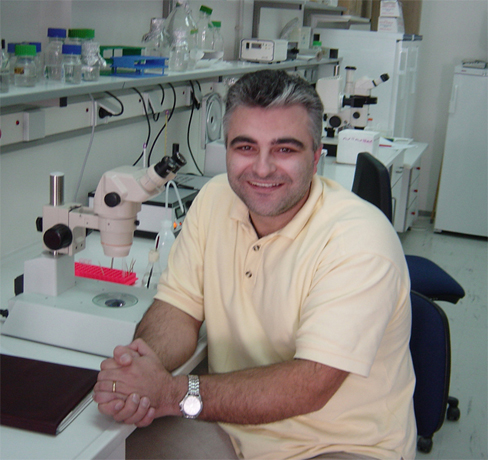Professor Nektarios Tavernarakis
Nektarios Tavernarakis, Ph.D. holds a Research Director (Professor) position at the Institute of Molecular Biology and Biotechnology, in Heraklion, Crete, Greece, heading the Caenorhabditis elegans molecular genetics laboratory. He is also an elected Excellence Professor of Molecular Systems Biology at the Medical School of the University of Crete.
Nektarios earned his Ph.D. degree at the University of Crete, studying gene expression in yeast, and trained in Caenorhabditis elegans genetics and molecular biology at Rutgers University, New Jersey, USA. His research focuses on studies of neuronal function and dysfunction.
His main interests are the molecular mechanisms of necrotic cell death in neurodegeneration and senescent decline, the molecular mechanisms of sensory transduction and integration by the nervous system, the interplay between cellular metabolism and aging, and the development of novel genetic tools for C. elegans research.
Nektarios is the recipient of a European Research Council (ERC) Advanced Investigator grant award, a European Molecular Biology Organization (EMBO) Young Investigator award, an International Human Frontier in Science Program Organization (HFSPO) long-term award, the Bodossaki Foundation Scientific Prize for Medicine and Biology, the Alexander von Humboldt Foundation, and the Friedrich Wilhelm Bessel research award. He is a member of the EMBO.
5 Recent Publications
- Artal-Sanz M. & Tavernarakis N. (2009) Prohibitin couples diapause signaling to mitochondrial energy metabolism during ageing in Caenorhabditis elegans. Nature, 461: 793–797.
- Eisenberg T. et al. (2009) Induction of autophagy by spermidine promotes longevity. Nature Cell Biology, 11: 1305–1314.
- Tasdemir E. et al. (2008) Regulation of autophagy by cytoplasmic p53. Nature Cell Biology, 10: 676–687.
- Syntichaki P. Troulinaki K. & Tavernarakis N. (2007) eIF4E function in somatic cells modulates aging in Caenorhabditis elegans. Nature, 445: 922–926.
- Syntichaki P., Xu K., Driscoll M. & Tavernarakis N. (2002) Specific aspartyl and calpain proteases are required for neurodegeneration in C. elegans. Nature, 419: 939–944.
